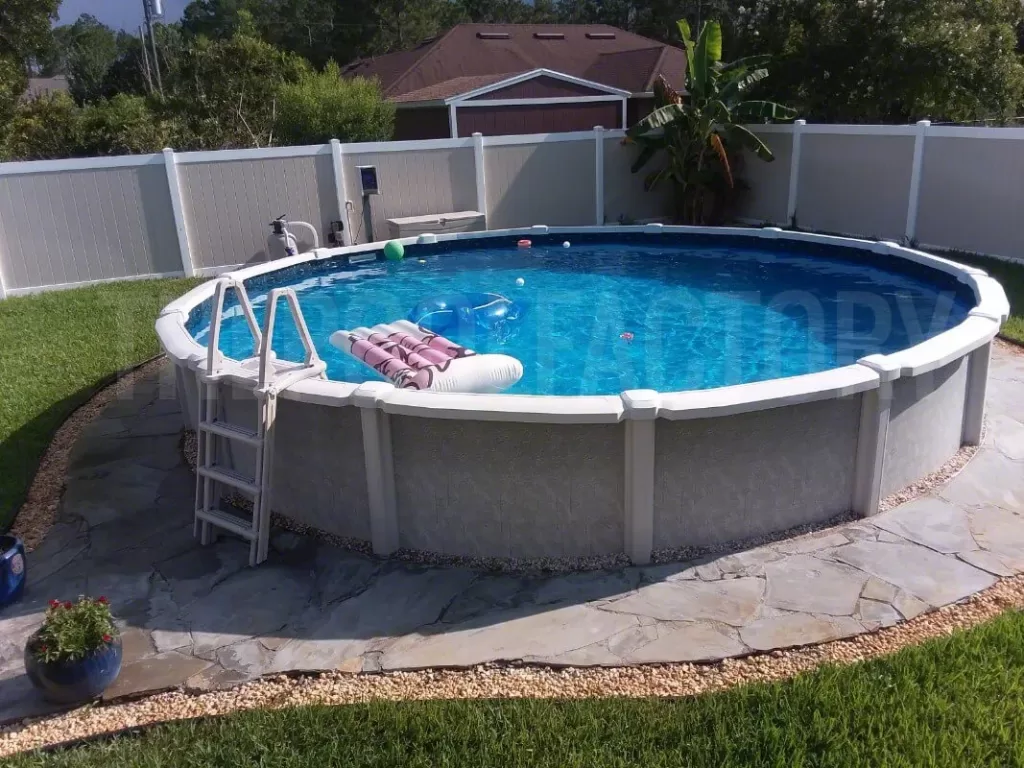
So you are considering an above ground pool? Or perhaps you just bought one or had enjoyed yours for a few years already.
That said, one of many questions above-ground pool owners ask themselves is:
How long will my above ground pool last? In general, Above ground pools typically last for 8 to 10 years if you have kept up on your maintenance, ensuring that the liner isn’t damaged and you reside in a predominantly warmer climate, and if it is made of vinyl instead of plastic, it should last you a long time.
It is important to remember that most above-ground pools have steel frames, so they will eventually rust and fall apart. There are also many variables that can shorten the life of an above-ground pool and we aim to discuss it all in the article.
The main factors that determine how long your above ground pool will last
Climate
If you live in a warm climate, your above-ground pool will last longer.
Simply put, pools that are protected from the wind, show, and other elements don’t have to be replaced as often.
Pool Material
If your above-ground pool is made of plastic, it won’t last as long as vinyl liner pools.
However, these are also much more expensive!
If you do opt for a vinyl pool, be sure to keep an eye on the seams as they are typically the first thing to show wear and tear.
Pools with covers
Above-ground pools that have solid covers tend to last much longer, as the added protection from sunlight helps prevent fading or cracking.
It’s not uncommon for someone who has a 12 gauge ring top pool cover to get over 10 years out of their above-ground experience!
Regular Maintenance
You have to make sure you keep the water clean, and that it’s well-maintained. Otherwise, your pool will fall apart.
There are many factors that can make your pool last longer. Above-ground pools have less stress on the structure than in-ground pools because they don’t need to be buried underground.
If you want to keep your above-ground pool going strong, follow these tips!
- Cleaning the filter regularly,
- keeping chlorine levels at an appropriate level,
- making sure there’s enough water in the pool are all important steps for maintaining a healthy swimming environment.
In order to get the most out of your pool for the money spent, you want to make sure that your swimming pool lasts a long time. With good maintenance, it can last for many summers without changing covers or new liners. The steps listed above should help keep your above-ground swimming pool going for many years if you take care of it properly.
How to extend the life of your above ground pool
The most important thing you can do to extend the life of your above-ground pool is to regularly clean and maintain it.
This includes:
- keeping the water properly balanced,
- cleaning up any debris or leaves in the bottoms,
- keeping everything draining correctly,
- flushing out all air from your filtration system
- filling with fresh water at least once per week with good quality water (sealed off from pesticides, fertilizers and other chemicals used on lawns).
Other factors that will influence how long your above-ground pool lasts include: proper storage; excessive use without maintenance; overuse by children/adults
Many people who own above-ground pools do not realize how quickly the metal will rust and start falling apart after several years of use.
Consider a Steal Frame Pool
If you want an above-ground pool that will last for many summers, then I recommend getting a steel frame pool.
Some steel frame pools are built with a galvanized steel skeleton which means no rusting or falling apart. Also, the pool walls are made out of fiberglass which is substantially stronger than any other material used in above-ground pool construction. The only problem is that they are much more expensive than other options.
Another option would be to convert your current pool into a vinyl-lined steel frame pool and save some money in the process.
Of course, If you want a pool to last for years without having any problems, invest in an inground pool instead of an above-ground one.
In-ground pools can be made out of steel or fiberglass so they won’t rust or break down over time as their cheaper counterparts do. Plus, inground pools come with warranties that cover everything from leaks to cracks in the lining!
When should I replace my above ground pool?
So now that we understand that you can enjoy your above-ground pool for years to come, the next question beckons.
When is it time to replace your above ground pool?
Honestly, that’s up to the pool owner. If you are happy and there is no obvious leakage, then keep on swimming away and keep up with the general maintenance as explained previously.
However, if you are considering replacing your pool then the materials that make up the pool should be looked at and assessed.
In most cases, when you have bubbles on the side of your pool, then it may be time to put in a new liner. Some pool owners have made the mistake of keeping a pool that had popped seams. This eventually resulted in the pool splitting apart.
Further to the above, you should also check the pool walls. This will help you determine if it needs a whole new cover or not. If there are no cracks in the wall, then you may only need a new top ring.
If there are cracks in the sides, then it’s possible that the liner may be split too. It really depends on how much damage has been done to your pool because every case is different.
Another way to tell is by removing the cover and checking out what is going on underneath it. If there aren’t any bubbles lining up with your seams (if you have a ring top) then your pool should last for a few more years.
Make sure there are plenty of ladders and stairs for people of all ages and sizes to ensure that no unnecessary weight is distributed on the steel frame.
Related Questions
Is it bad to have wrinkles in pool liner?
If you have a lot of wrinkles in your pool, you may want to get another one. Wrinkles will cause stress on the pool structure, making it weaker. If you have wrinkles in your pool, you can go ahead and add some water to the pool so when the liner does start to rip (it’s going to eventually) it helps protect your pump/filter system.
You may want to consider a new above-ground swimming pool if there are too many wrinkles or if they cover a large area of the wall. This is because a lot of stress is being placed on that part of the wall. You need to be sure that nothing tears from moving around so much! The last thing that you want is for your kids or yourself to get hurt while swimming!
If you don’t like having wrinkles in your liners but don’t want to go out and buy a new pool, you may want to consider filling the wrinkles in with cement. Make sure that you do this instead of leaving the water in there. This will help protect your pump/filter system.
If you don’t like having wrinkles in your liners but don’t want to go out and buy a new pool, you may want to consider filling the wrinkles in with cement (instead of leaving water in it). You can use concrete or rubber-based sealant if they are small. It’s best to get help from someone who has experience doing this sort of thing before trying on your own because it could end up costing quite a bit more than what you were expecting!
And remember – Always use caution when working with cement, especially around water!
Can you put a new pool liner over an old one?
Yes, you can put a liner over an old one, but it’s much better to replace the old liner with a new one if possible.
If you have a large number of wrinkles in your pool, then you’re going to need to get a new cover or liner. If there are just a few and they’re mainly on the corners or along the seams, then it may be something that can be fixed by adding water to help protect your pump/filter system.
Will salt damage a pool liner?
Salt used to be a popular method of treating pools, but it has fallen out of favor in recent years because many people believe it damages the pool liner. The truth is that salt itself won’t damage your pool liner if you use it properly, but there are other reasons that you might be better off choosing a different method of treating your pool water. It’s best to use a salt-based pool system only if you have an older swimming pool that hasn’t been treated with modern chemicals and processes.
How far will a pool liner stretch?
approximately three feet
PRO TIP: If your pool liner seems like it’s too small or doesn’t have enough material to go around the pool, don’t panic.
The liner is made to be carefully stretched up to three feet. The manufacturer has allowed for a generous amount of overlap and accidental tearing in order to make sure that you will have enough space no matter what size your pool is. You should still measure before ordering as there are many variations of styles and sizes available.
Conclusion
Above-ground pools typically last for 8 to 10 years on average. If you want your pool to be around longer, it is important that you take care and precaution during seasons and put in some time doing maintenance every now and then. The type of material they are made of also plays a role – an above-ground pool will not last as long if its walls are made out of vinyl instead of PVC or plastic.
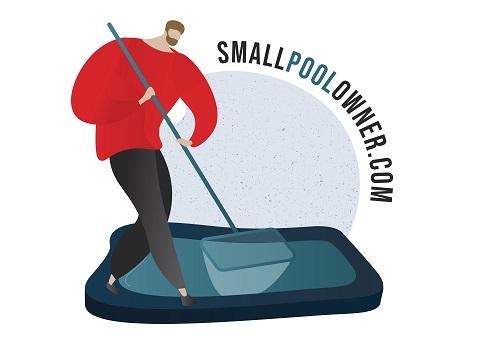
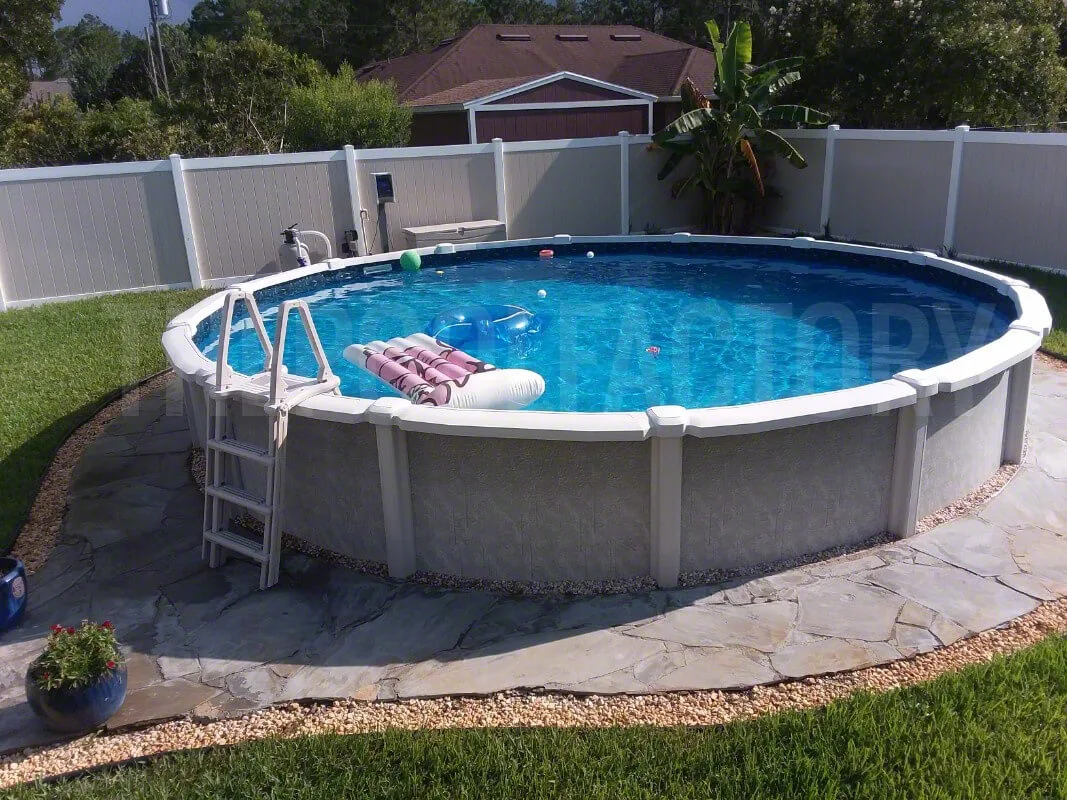



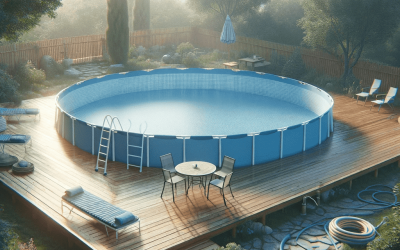
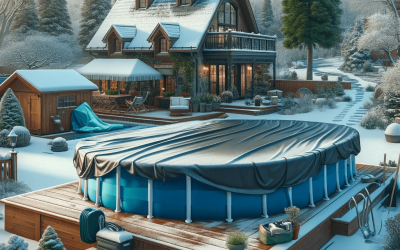
0 Comments